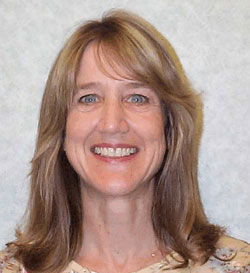 UNMC researcher Shelley Smith, Ph.D., answers questions about her work, life and interests.
UNMC researcher Shelley Smith, Ph.D., answers questions about her work, life and interests.
NOTE: This profile is part of a series highlighting the 25 researchers who were named UNMC Distinguished Scientists for 2006. Each of these researchers will be profiled in UNMC Today leading up to a March 12 ceremony to recognize their achievements.
- Name: Shelley Smith, Ph.D.
- Title: Professor of pediatrics
- Joined UNMC: 1999
- Hometown: Cedar Rapids, Iowa
Describe your research in 25 words or less.
Our major work is aimed at localizing and identifying genetic mutations influencing developmental disorders in humans, primarily language disorders such as dyslexia.
How did you decide to pursue this area of research?
I was very intrigued by genetics from the time I was first introduced to it in school and focused on human genetics for graduate school. I got an opportunity as a graduate student to work with Dr. Herbert Lubs, a physician who was interested in a variety of medical genetic disorders. He had just discovered the Fragile X syndrome, although the unique molecular basis of it was unknown, and it was then called “Marker X.” He knew of some Swedish families who appeared to have an autosomal dominant form of dyslexia and suggested I study them to find the gene. The more we worked on it, the more we realized that it was not a single gene disorder and that we had to adapt the methods of quantitative genetics to it.
When did you realize you were interested in research?
In college, I did a semester at the Argonne National Laboratory working in a bacteria genetics lab. That was my first exposure to a large research lab and I enjoyed the whole atmosphere. The process of identifying a question and designing the ways to answer it seemed like a wonderful way to make a living!
What are the greatest challenges in research today?
Lack of understanding of science by the general public. This not only affects our culture and the application of scientific progress, but also affects public support for science.
Best advice for new researchers?
You have to love it. That takes care of the drive to keep going. Practical advice involves being sure your question is important and clear and your methods can test it effectively, which is the basis of planning good work and writing a good grant.
When an experiment stalls, what drives you to continue on?
It means that there is something we don’t understand and that leads to more questions. It just requires patience to go over the problem and see what is holding things up.
Who has been your greatest teacher?
There have been many, each teaching a different facet. One of the most memorable over my whole career has been Barton Childs, a physician and educator at Johns Hopkins, who encouraged me as a graduate student to continue to work on a trait that was proving to be quite difficult to handle with the techniques available at the time. I believe he understood dyslexia as a model for genetic disorders that we now recognize as “quantitative trait loci.” Bill Kimberling was an excellent teacher of genetic analysis and Bruce Buehler has probably been my most comprehensive mentor, covering clinical genetics and career development. He also has been a great example of someone who has had a vision for the development of programs and has implemented them, something we are trying to apply in the COBRE program.
Tell us about your family and hobbies outside the lab.
I have two daughters. One got married last summer and is working in Peoria, Ill., and the other just graduated from college and is spending a year in China teaching English at a University in Changsha, Hunan Province. I enjoy traveling, theater, museums, snorkeling, skiing, camping and hiking. I am trying to become a decent gardener.
Globally, describe the most notable research achievement ever?
I imagine the most influential “Man of the Year” type recognition would have to go to Charles Darwin. His insights have provided an enduring foundation for understanding genetics in populations, but his theories also are notorious for their appropriation by some social movements and for their strong rejection by others.
Clarify a common misconception about research?
I think people outside of research believe we are committed to proving a hypothesis rather than testing it and that making a hypothesis that is disproved is a sign of failure. This leads to confusion in the general public about the inevitability of conflicting results.
What would you tell a student interested in a research career?
You have to enjoy the fact that it is always changing and unpredictable, even though you are always trying to predict what will happen!
What is something few people know about you?
Since my field is medical genetics, I also do some genetic counseling. Although I didn’t come to UNMC until 1999, I have been participating in MMI genetics outreach clinics since 1987.